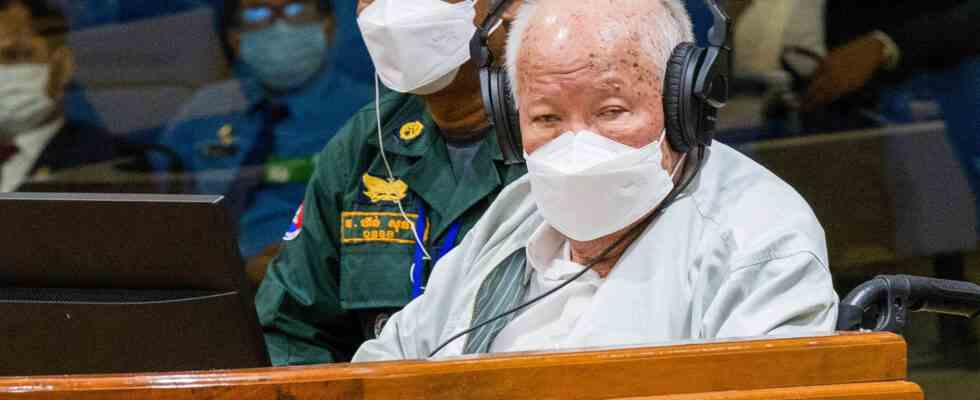Status: 09/22/2022 10:38 a.m
The Special Court on the mass murder of the Khmer Rouge has upheld the verdict against former head of state Khieu Samphan. He remains in custody. The tribunal is thus ending its work after 16 years.
With the verdict against a former leader of the Khmer Rouge in Cambodia, the special court to punish the crimes of the murderous Pol Pot regime has ended its work after 16 years. The United Nations-backed tribunal in Phnom Penh rejected the appeal of the last survivor of the then government, Khieu Samphan.
Last living senior representative
The 91-year-old is the last surviving senior representative of the Khmer Rouge. In 2018 he was convicted of the genocide of ethnic Vietnamese – the killing of the Cambodian population was not classified as genocide. He appealed against it last year. He has always denied any involvement in the crimes against which he is accused.
Judge Kong Srim dismissed the assurances of the former head of state in his verdict. Khieu Samphan “had direct knowledge of the crimes” and shared the aim of other Khmer Rouge leaders, said the head of the Extraordinary Chamber of the Supreme Court. The court therefore rejects the defense’s arguments.
Even if he were acquitted, Khieu Samphan would have remained in prison, having been sentenced to life imprisonment for crimes against humanity in 2014. The verdict was upheld in 2016.
500 people at sentencing
Khieu Samphan attended the two-and-a-half-hour sentencing hearing in a wheelchair. It was also attended by about 500 relatives of victims, survivors, diplomats and representatives of the Cambodian government. Court spokesman Nth Pheaktra then spoke of a “historic day”.
background
The Khmer Rouge’s reign of terror in Cambodia lasted from 1975 to 1979. According to estimates, around 1.7 million people died during these years as a result of forced labour, starvation, torture and murder – almost a quarter of the total population.
In 1975 they overthrew the US-backed and unpopular government. The new regime under Pol Pot wanted to realize a moneyless peasant state. It forced the townspeople into the countryside and prescribed them hard labour.
Hundreds of thousands of people died from famine, epidemics and forced labour. Hundreds of thousands more suspects were tortured and murdered as enemies of the regime. Altogether almost two million people fell victim to the Khmer Rouge’s reign of terror – almost a quarter of the total population.
In 1979, Vietnamese troops expelled the Khmer Rouge and moved into the capital Phnom Penh, which had been deserted for four years. For years no one was held accountable because Cambodia became the plaything of the world powers and sank into civil war. Pol Pot died safely in the province in 1998.
A total of three convicts
The tribunal to review the rule of the Khmer Rouge under dictator Pol Pot was founded in 2006. Overall, the court found three suspected Khmer Rouge masterminds guilty and sentenced: the chief ideologue Nuon Chea, who died in 2019, the former head of the S-21 torture prison, who died in 2020, Kaing Guek Eav aka Duch, and ex-head of state Khieu Samphan.
No trial of four suspects
The court costs are reported to have totaled more than 330 million euros. Four suspects, believed to be middle-ranking Khmer Rouge officials, were not tried because of differences among the court’s legal staff.
The tribunal was structured in such a way that Cambodian and international lawyers worked together. In order for a trial to take place, they had to come to an agreement. The international representatives wanted to bring the four suspects to justice.
But the Cambodians refused after Cambodian Prime Minister Hun Sen said there would be no further prosecutions because they could lead to unrest. Hun Sen, who has ruled Cambodia for 37 years, was once a mid-level commander of the Khmer Rouge.
After the conclusion of his last case, the special tribunal is expected to dissolve in three years.

